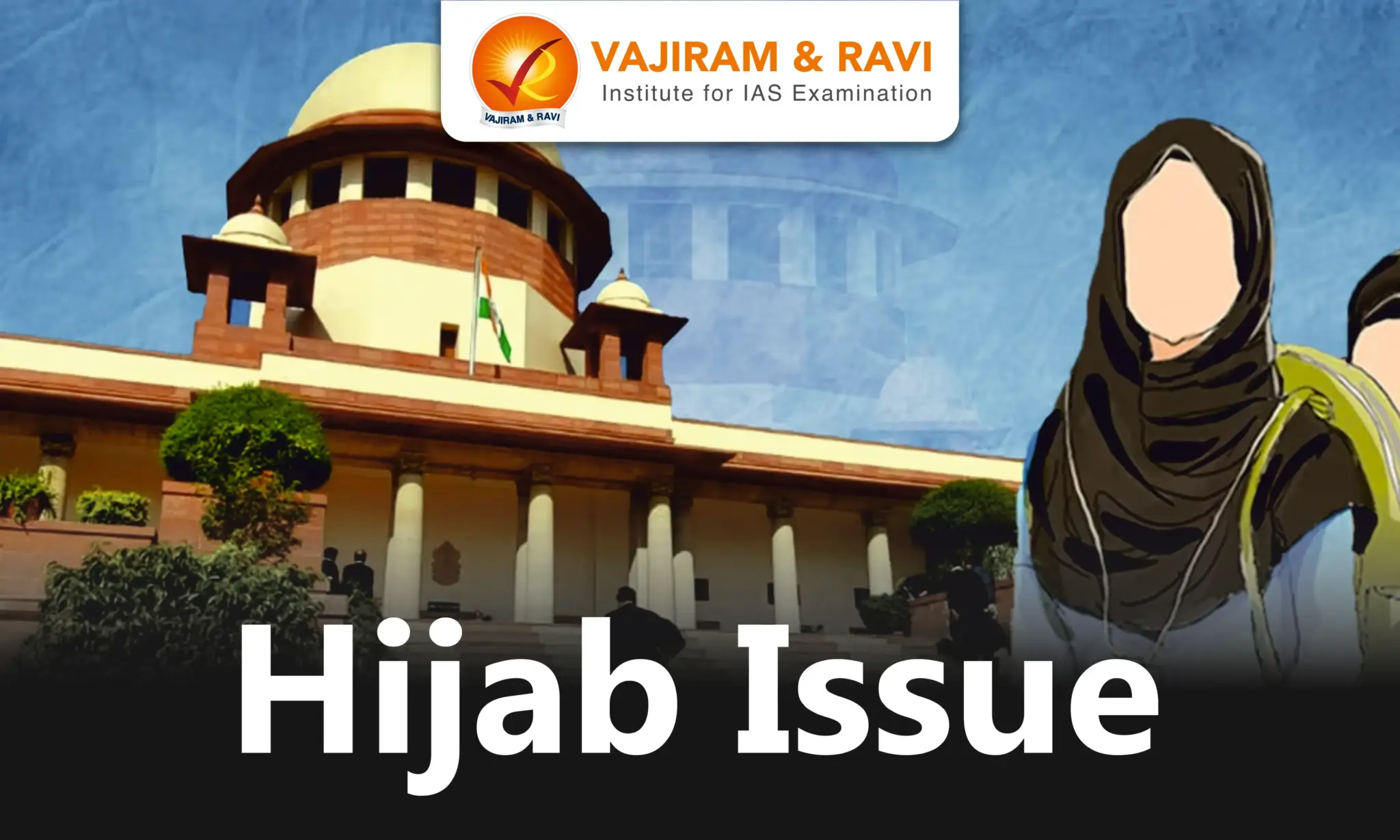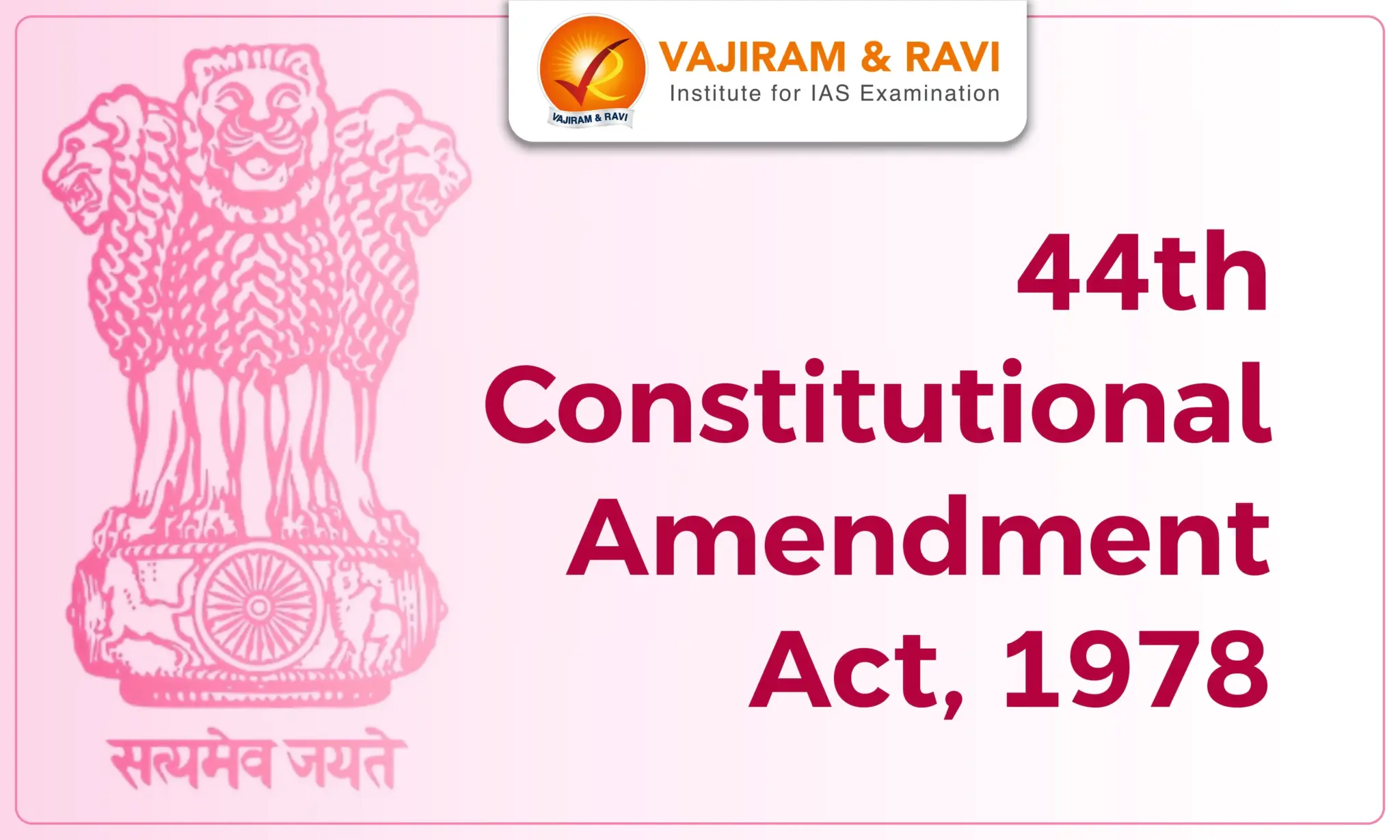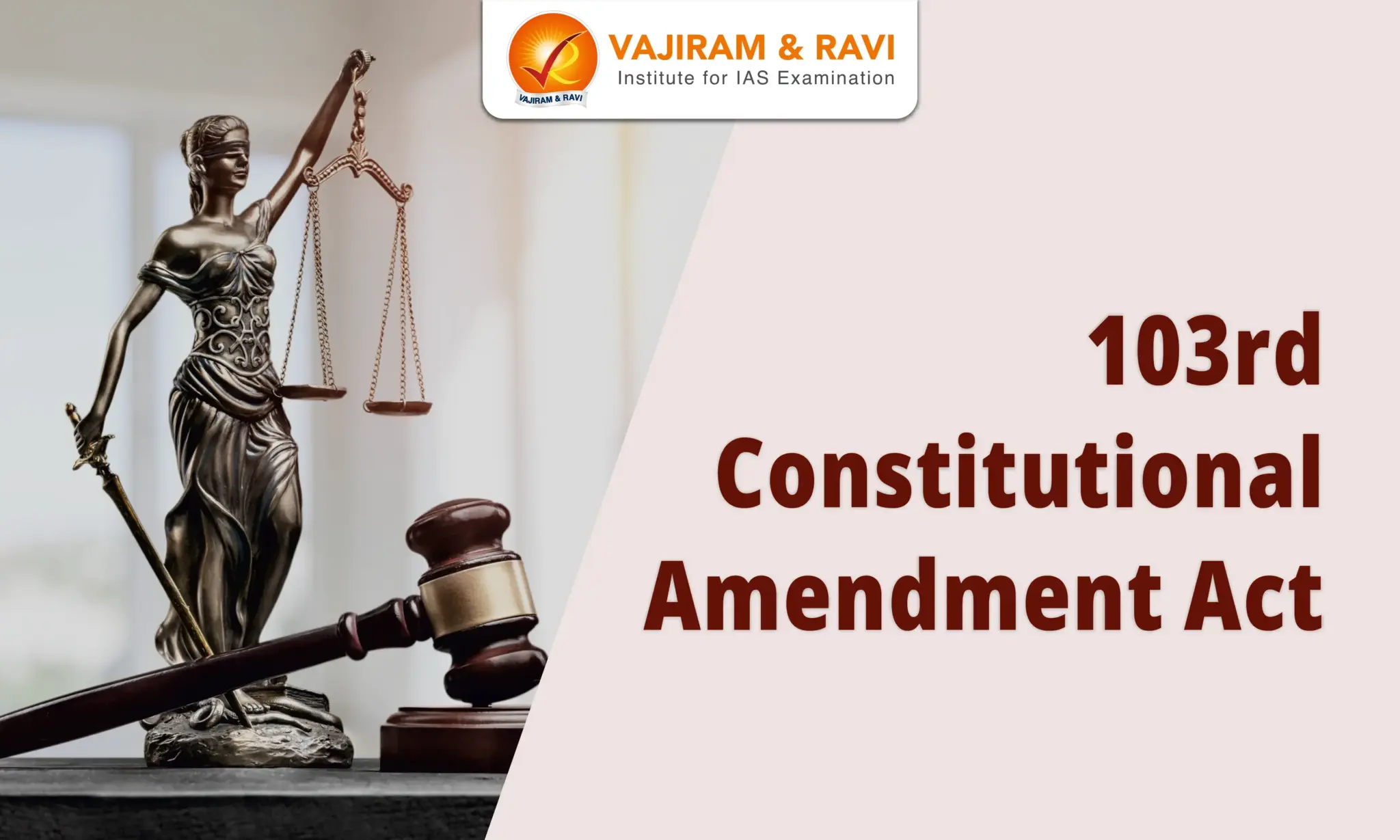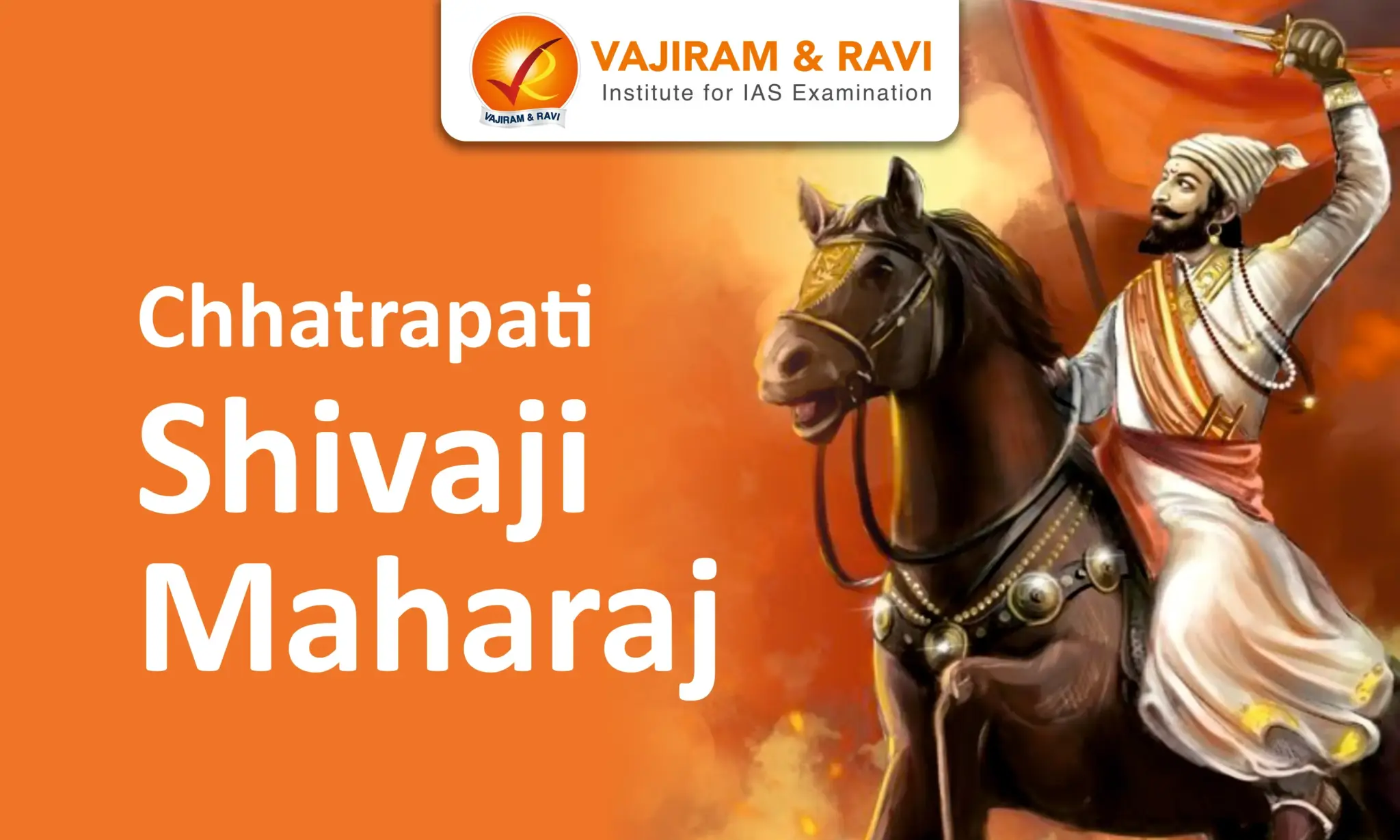The hijab issue controversy began in February 2022, when a government pre-university college in Udupi, Karnataka banned hijab inside classrooms. The issue sparked widespread protests, with many students, mostly girls, taking to the streets to defend their right to wear hijab in school. The government order was challenged in the Karnataka High Court, which upheld the government's order. Later, the Supreme Court delivered a split decision in the Hijab Ban case and it would need the larger bench to decide the case.
In India, the hijab controversy, particularly after the 2022 Karnataka hijab ban, has sparked a national debate about the Right to Equality, Right to Dignity, Right to Freedom of Speech, Right to Freedom of Religion, etc.
What is the Hijab Issue?
A hijab is a headscarf that is used by Muslim women to cover their heads. However, this concept is not unique to Islam and is shared by other religions such as Judaism and Christianity.
- Issue: After six students were barred from entering a college in Karnataka's Udupi district in 2022 for wearing a hijab, the debate over whether educational institutions can impose a strict dress code that may infringe on students' rights has spread to other parts.
- The issue has raised legal questions about how to interpret religious freedom and whether the right to wear a hijab is constitutionally protected.
- The college administration said that they were following Karnataka government guidelines in order to ensure uniformity among students of the institution.
- High Court Decision: In March 2022, the Karnataka High Court ruled that wearing the hijab is not mandatory in Islam and upheld the executive order.
- Citing the Hijab as not a part of ‘Essential Religious Practice’, they held that the ban did not violate the right to freedom of speech and expression (Art. 19), as it was a reasonable restriction to maintain discipline in public spaces.
Supreme Court Judgment
In the Karnataka Hijab Ban Appeal, a two-judge Supreme Court bench delivered a split verdict in October 2022.
- Support for the hijab ban:
- One of the judges held that the Karnataka government was perfectly within its rights to prohibit the wearing of the hijab in educational institutions.
- He stated that the State government's policy promoted intercommunal harmony.
- Allowing students to wear the Hijab in a secular setting would create feelings of inequality among students.
- He held that adherence to uniform was a reasonable restriction to free expression. A student does not have the right to wear a headscarf to a secular school.
- Against Hijab ban:
- Another judge of the bench stated that the education of the girl child is a matter of preference. He stated that it is a violation of her Fundamental Right guaranteed by Articles 19(1)(a) and 21 of the Indian Constitution.
- He described the right to wear a hijab in school as a "choice," a "fundamental right" related to the girl's "dignity and privacy even when she is inside the school gates."
- He also cited that the hijab ban would cause students to drop out or transfer, negatively impacting their education.
- Current status: The issue is currently undecided due to the split verdict.
- The onus is now on the Chief Justice of India to assign this case to a larger bench.
Other Judgments on the Hijab Issue
- In 2015, the Kerala High Court directed the Central Board of School Education (CBSE) to implement additional measures to check students who intend to wear a dress that is religiously appropriate but violates the dress code.
- The court stressed that religious feelings should not be hurt and that discipline should not be jeopardised.
- The Kerala High Court in the case of Amna Bint Basheer v Central Board of Secondary Education (2016) recognised the practice of wearing a hijab as an essential religious practice but did not overturn the CBSE rule.
- The court once permitted the implementation of "additional measures" and safeguards to protect religious sentiments while maintaining the integrity of the examination process.
- In Fathima Tasneem v State of Kerala (2018), the Kerala High Court ruled that the collective rights of an institution should take precedence over the petitioner's individual rights.
Different Views on the Hijab Issue
In India, the Hijab issue has sparked a wide range of perspectives and opinions, reflecting a variety of perspectives on religious freedom, cultural identity, education, and societal values.
Arguments for the Hijab Ban
- Against secularism: Wearing a Hijab in educational institutes and competitive exams would be against secularism, as the uniform is an equaliser of inequalities.
- Proponents of the ban believe religious symbols, such as the hijab, should not be allowed to influence public spaces such as schools.
- Against educational values: Allowing defiance of rules by allowing religious symbols such as the hijab could be seen as contradictory to the concept of discipline.
- No absolute fundamental rights: The right to religion is not an absolute fundamental right and cannot override other fundamental rights, especially when the educational institutes are funded by the government.
- Further, The Karnataka High Court held that Hijabis is not an Essential Religious Practice in Islam.
- Upholding the right to equality: Imposing the ban on Hijab furthers the cause of equality by not allowing different laws for different religious groups, thereby upholding the Right to Equality.
Arguments against the Hijab Ban
- Religious freedom: According to the petitioners, wearing the hijab is a religious duty mentioned in the Quran unlike cow sacrifice or triple talaq and a fundamental right protected by Article 25 of the Indian Constitution.
- Against Article 21: It is claimed that the right to dress as one pleases, as part of the Right to Dignity under Article 21, is a fundamental right of the individual and that any restrictions on this right must have a reasonable basis.
- Access to education: Some see the hijab as a way for conservative families to allow their girl child to attend school, and as such, banning the hijab could limit access to education.
- According to the NFHS-5, the proportion of Muslim girl students in the 6-17 age group attending school in 2019-20 was significantly lower than the proportion of Hindu and Christian students in almost all states except Kerala.
- Hijab not harmful practice: According to Justice Sudhanshu Dhulia, if the belief in wearing a hijab is sincere and does not harm anyone else, there are no justifiable reasons for prohibiting it in the classroom.
- Essential Religious Practices: This doctrine has not been spared from criticism. It is the Courts and not the religious denominations themselves that have the power to determine the essentiality of a practice. The institutional competence of the Courts is sometimes questioned.
Last updated on February, 2026
→ UPSC Notification 2026 is now out on the official website at upsconline.nic.in.
→ UPSC IFoS Notification 2026 is now out on the official website at upsconline.nic.in.
→ UPSC Calendar 2026 has been released.
→ UPSC Final Result 2025 is expected to be released in the first week of March 2026.
→ Check out the latest UPSC Syllabus 2026 here.
→ Join Vajiram & Ravi’s Interview Guidance Programme for expert help to crack your final UPSC stage.
→ UPSC Mains Result 2025 is now out.
→ UPSC Prelims 2026 will be conducted on 24th May, 2026 & UPSC Mains 2026 will be conducted on 21st August 2026.
→ The UPSC Selection Process is of 3 stages-Prelims, Mains and Interview.
→ Prepare effectively with Vajiram & Ravi’s UPSC Prelims Test Series 2026 featuring full-length mock tests, detailed solutions, and performance analysis.
→ Enroll in Vajiram & Ravi’s UPSC Mains Test Series 2026 for structured answer writing practice, expert evaluation, and exam-oriented feedback.
→ Join Vajiram & Ravi’s Best UPSC Mentorship Program for personalized guidance, strategy planning, and one-to-one support from experienced mentors.
→ Check UPSC Marksheet 2024 Here.
→ UPSC Toppers List 2024 is released now. Shakti Dubey is UPSC AIR 1 2024 Topper.
→ Also check Best UPSC Coaching in India
Hijab Issue FAQs
Q1. What is the Hijab issue in India?+
Q2. Is it permissible for students in India to wear the Hijab in educational institutions?+
Q3. What does a split verdict mean?+
Q4. What is the current status of the Hijab issue in India?+
Tags: hijab issue quest
















